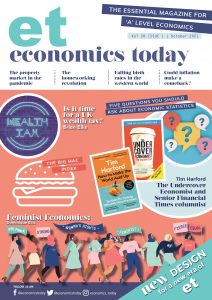In an act of blatant plagiarism I have sourced the title for today’s post from a Newman cartoon in a recent copy of The Spectator.
What is the common theme? Chicken at Nando’s, milkshakes at McDonald’s, beer at Spoons, Haribo star mix, wine this coming Christmas. The answer is that shortages of all these food and drink items have been experienced in recent weeks, or are expected soon. Sections of empty shelving have become commonplace in our supermarkets.
If we were to add rubbish waiting for collection to the list, it would be the odd one out, not just because it’s not food or drink, but because we have too much of it rather than too little. The common cause is a shortage of HGV drivers which is making it difficult to get produce to the consumer and difficult for councils to empty the bins too.
Why is there such a shortage of drivers? This is widely attributed to a ‘perfect storm’ of factors. One of these is Brexit, which has reduced the inflow of labour to the UK and has seen some drivers choose to return to the countries of their birth. Another is that periods of Covid lockdown have denied potential new drivers the opportunity to train and to take tests to gain their HGV licences. There is also the fact that age profile of HGV drivers is seeing many reach retirement age. The Road Haulage Association indicates that 2000 drivers are leaving the occupation each week, but only 1000 joining. Finally, there is the “pingdemic” which, while now subsiding, has seen many firms lose drivers to self-isolation.
The shortage of HGV drivers is not really a new problem, although it is one that has recently reached crisis point and begun to impact noticeably on consumers. Barry Harrison wrote an excellent feature on the issue for the March 2020 edition of Economics Today. It can be downloaded free here and subscriptions to the new volume of Economics Today are available here.
As economists, we can point to the likely effects on wages or lorry drivers, the costs of firms and the prices of goods. We might question whether the labour market is experiencing a market failure, given that we usually expect the price mechanism to allocate resources efficiently and we will also have an interest in possible policy solutions, one of which is temporary visa scheme to allow HGV drivers to migrate to the UK from EU countries.
We should also be aware of wider issues. Shortages of goods are not confined to food and drink. It’s also thought likely that there will be excess demand for toys this Christmas and, perhaps more seriously, there is currently a shortage of tubes to collect blood for testing and difficulties for GPs in obtaining supplies of the flu vaccine. Moreover, it is not only the haulage industry that is experiencing labour shortages. The hospitality sector (mainly pubs, restaurants and hotels) has also faced big problems in recruiting and retaining staff. Furthermore, issues in supply chains are broader than just labour shortages. Increased paperwork demands for importers and exporters in the wake of Brexit are also having an impact.
At a macroeconomic level, much attention is given at the moment to the return of inflation (a sustained increase in the general price level) and, with inflation widely expected to hit about 4% by the end of the year, whether such levels, or even higher, will be here to stay. A huge factor in this is expectations of inflation. If these become “de-anchored” and workers come to expect inflation to be much higher than it has for most of the past three decades, the danger is that these expectations are reflected in higher wage settlements and that a wage-price spiral develops. Labour shortages put workers in a stronger bargaining position and make such an outcome more of a possibility than has been widely acknowledged.

Economics Today – see Economics everywhere! Subscriptions here






